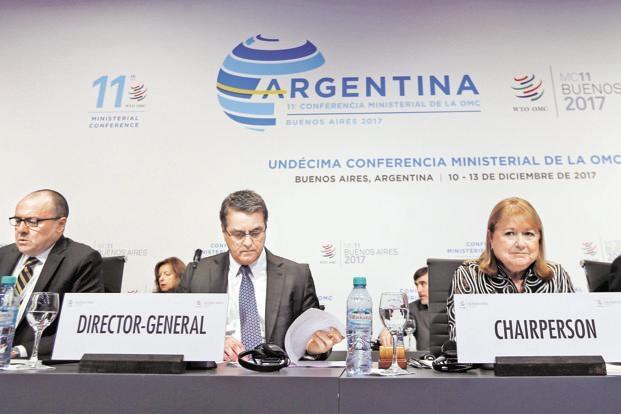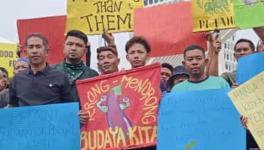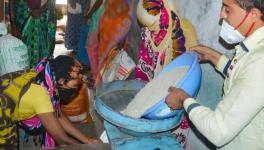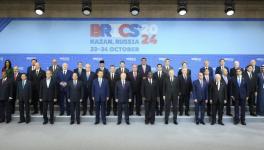WTO Ministerial Conference Ends in Stalemate Amid US ‘Sabotage’

Image Courtesy: LiveMint
The 11th Ministerial Conference (MC11) of World Trade Organisation (WTO), after four days of ‘intense’ negotiations, ended in a deadlock. It was only able to agree on continuation of moratoriums on e-commerce and TRIPS non-violation complaints. The MC11 was expected to negotiate over major trade related issues including e-commerce and investment facilitation, public stockholding, and curb on farms and fisheries subsidies, many arising out of unresolved issues from Doha round talks. The ministerial meeting, held at least once every two years, is the highest decision-making body of the WTO giving political direction to the organisation.
“The collapse of the WTO ministerial was “the best outcome possible” given the position of rich countries at this week’s summit. Rich countries like Britain [and US] want to turn the whole world into a corporate playground”, said Nick Dearden, Global Justice Now, United Kingdom.
Nabil Abdo of the Arab NGO Network for Development, a network with members and partners in 12 Arab countries said, "The WTO failed again to deliver on development, and put the needs of people, farmers, workers, and vulnerable people at the centre of its concerns.”
India, South Africa, Venezuela and a large majority of developing countries pressed to insert language that the unfinished Doha round negotiations must continue until all issues are resolved satisfactorily by members till the next conference in 2019.
Supporting the developing countries’ demand, China’s trade envoy to the WTO ambassador Xiangchen Zhang had said, “We fully support the proposal from India and South Africa.”
The US, along with 44 other countries, by issuing a joint statement fiercely opposed any mention of the Doha work programme and Doha Development Agenda (DDA) in the ministerial declaration.
India was opposed to the issues of e-commerce and investment facilitation being taken up for discussion at the WTO MC11. According to experts, the definition and meaning of e-commerce varies from country to country, and the ministerial conference stage is not mature enough, at present, to discuss this.
“When e-commerce discussions began in WTO, it meant only electronic transmissions, not even video transmissions. Over the years, it encompasses everything. If you agree to liberalise e-commerce trade today you will be allowing complete economic liberalisation through the front door,”, said Biswajit Dhar, a Professor at Jawaharlal Nehru University, New Delhi.
The 1996 WTO Information Technology Agreement, which led to abolishment of tariffs on hardware, ended up hurting the India’s domestic electronics manufacturing industry.
India had prioritised TRIPS non-violation moratorium. Along with Indonesia, it objected to renewing the e-commerce duties moratorium. Sources say Indonesia and India linked that moratorium to some of their priority issues, such as an outcome on public stockholding for food security, according to report.
The permanent solution on the issue of public stockpiling for food security was a top priority for developing countries, including India. The Agreement on Agriculture (AoA) states that developing countries can provide agricultural subsidies or aggregate measurement support (AMS) up to 10% of the value of agricultural production. At present, their exists a ‘peace clause’, where even if a country breaches the 10% subsidy cap as stipulated by the multilateral trade body, no action can be taken against the ‘violating’ country by the member states of WTO.
Many argue that a permanent solution to this issue could help reduce hunger in the poorest countries. The US, which questioned special and differential treatment to countries with a high GDP, refused to finalise a permanent solution for public stockholding, reported PTI.
“It is sad that WTO members could not reach a permanent, acceptable, pro people solution on public stockholding. We were hoping that developed countries would at least now give prominence to human lives over agribusiness and profiteering food business”, said Sachin Kumar Jain from Right to Food Campaign, India.
Another issue that had to come up for negotiations was the curbing of farm and fisheries subsidies being pushed by developed nations, which the developing countries successfully managed to thwart.
“The decision by Ministers in regards to fisheries subsidies upholds the right to develop for developing countries. The draft decision, under the guise of sustainability, would have been used by rich industrial fishing nations to prevent developing countries from being able to fulfil their developmental aspirations. The lack of a final outcome rests on the reluctance of Europe, New Zealand, the US and others to constructively attempt to resolve the development component”, said Adam Wolfenden, Campaigner with the Pacific Network on Globalisation, a Pacific Islands based network promoting economic self-determination.
Activists argue that the WTO's current "crisis of legitimacy" is the result of an increasing incapability to balance rich countries' commercial interests and the demands of poorer countries to address development concerns.
Get the latest reports & analysis with people's perspective on Protests, movements & deep analytical videos, discussions of the current affairs in your Telegram app. Subscribe to NewsClick's Telegram channel & get Real-Time updates on stories, as they get published on our website.
























